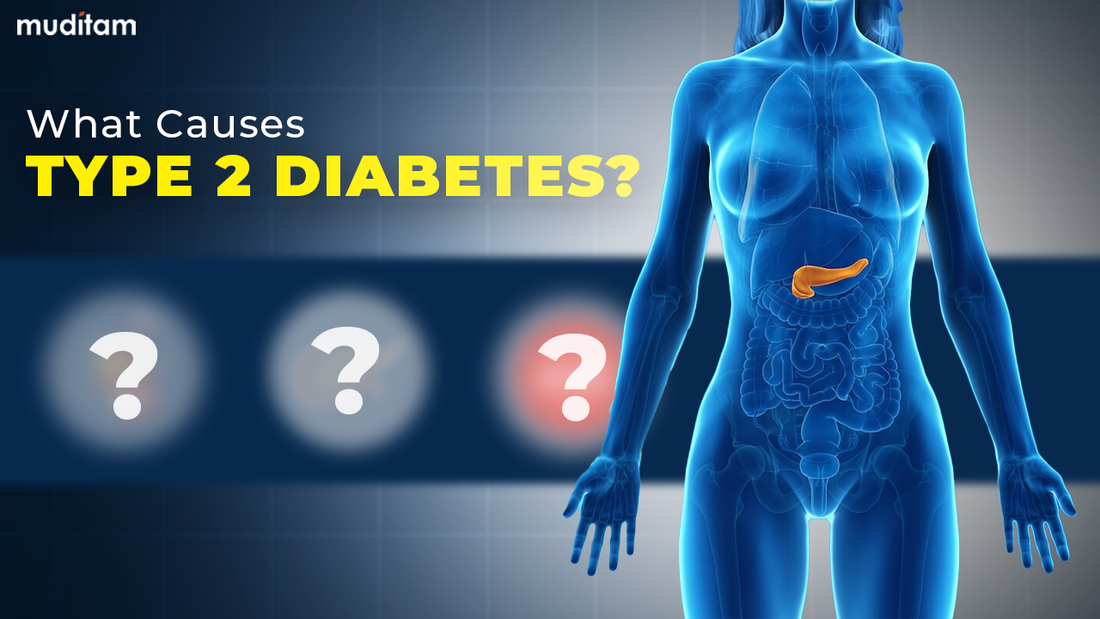
What Causes Type 2 Diabetes?
Share
The condition of Type 2 diabetes has grown to become an increasingly common condition for people around the world. Do you understand the root of this condition? A lot of people believe it's due to the consumption of too much sugar, however, it's much deeper and more complicated than that. In this article, we'll explain it in simple terms so that you'll understand the factors that lead to diabetes type 2 and what you can do to manage it.
Understanding Type 2 Diabetes
The condition is called type 2 diabetes because your body isn't able to use insulin correctly. Insulin is a chemical produced by the pancreas, and its function is to aid in helping glucose move out of the bloodstream into cells and then use it as energy. When the process doesn't function as it ought to, the sugar remains in your bloodstream, which can cause elevated blood sugar levels.

What Triggers Type 2 Diabetes?
Many factors can be responsible for the onset of diabetes type 2. We'll take a look at the main causes:
- Insulin Resistance: Over time, the body's cells may become less sensitive to insulin. This is known as insulin resistance. When this occurs, the pancreas releases greater amounts of insulin to compensate, but it cannot do this forever, leading to elevated blood sugar levels.
- Unhealthy Eating Habits: Consuming too many processed foods, sugary drinks, or unhealthy diets can increase weight and raise your chances of developing Type 2 diabetes. A diet low in fiber and high in unhealthy fats can make the condition worse.
- Being Overweight or Obese: Carrying extra weight, especially around your abdomen, is one of the main risk factors for Type 2 diabetes. Excess fat makes it harder for your body to process insulin efficiently.
- Family History: Genetics also play a role. If a family member has diabetes, your risk is higher. However, lifestyle choices can still make a big difference.
- Lack of Physical Activity: Being inactive affects how your body manages sugar. Regular exercise helps your body use insulin more effectively and keeps blood sugar levels in check. Without it, your risk of diabetes increases.
- Hormonal Changes: Conditions like polycystic ovary syndrome (PCOS) and other hormonal imbalances can increase the likelihood of developing Type 2 diabetes.
- Aging: As you age, your risk of developing Type 2 diabetes increases due to your body becoming less efficient at managing blood sugar.
- Stress and Sleep Issues: Stress and poor sleep routines can impact blood sugar levels and your body's ability to produce insulin properly.
Also Read: Best Ayurvedic medicine for sugar control in India | What is Type 1 and Type 2 Diabetes?
Symptoms of Type 2 Diabetes
Recognizing early signs can help manage the illness successfully. Common symptoms include:
- Feeling very thirsty
- Frequent urination
- Constant fatigue
- Blurred vision
- Slow-healing wounds
- Numbness in hands and feet
If you experience these symptoms, visiting a doctor for an accurate diagnosis is crucial.
Can You Prevent Type 2 Diabetes?
Yes! The good news is that making small lifestyle changes can help prevent Type 2 diabetes or slow its progression. Here are some helpful tips:

- Eat a Balanced Diet: Focus on whole foods such as vegetables, fruits, whole grains, and lean protein. Limit sugary drinks and processed foods.
- Stay Active: Aim for at least 30 minutes of activity daily. Even a short walk can make a big difference.
- Maintain a Healthy Weight: Losing even a small amount of weight can significantly lower your risk of developing diabetes.
- Manage Stress: Practice relaxation techniques like meditation or yoga to keep stress levels in check.
- Get Regular Check-Ups: Routine health check-ups help monitor your blood sugar levels and detect any early changes.
Conclusion
The symptoms of Type 2 diabetes may seem intimidating, but understanding its root causes empowers you to take control of your health. By making smart choices about your diet, exercising regularly, and managing stress, you can reduce the risk of developing this condition. Always remember, prevention is better than cure!
Start your journey to healthier living today.
You May Also Like:



